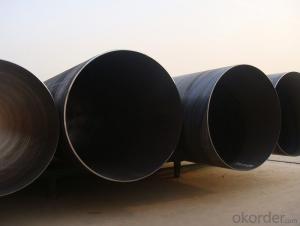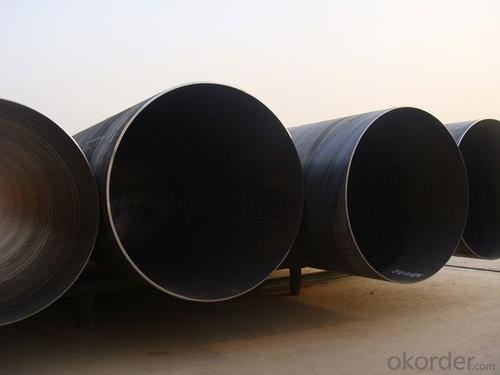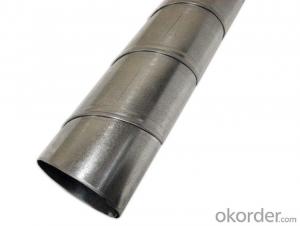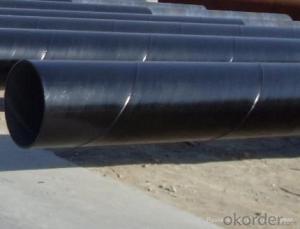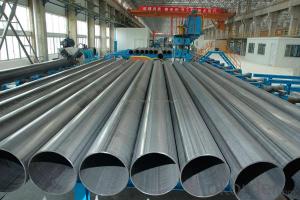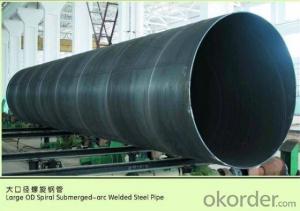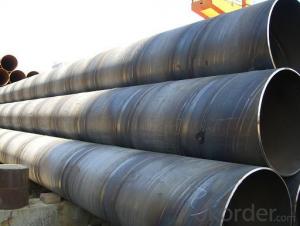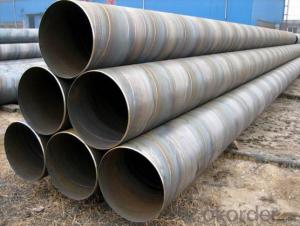SPIRAL WELDED STEEL PIPE 48 LARGE DIAMETER CARBON
- Loading Port:
- Tianjin
- Payment Terms:
- TT OR LC
- Min Order Qty:
- 5 m.t
- Supply Capability:
- 3000 m.t/month
OKorder Service Pledge
OKorder Financial Service
You Might Also Like
Packaging & Delivery
Packaging Detail: | standard export packing or as customer's requirement |
Delivery Detail: | within 10 - 30 days |
Specifications
Spiral Welded Steel Pipes and Tubes
1.Material:Q195-Q235
2.Length:1-12m
3.WT:1.0-14mm
4.O.D.:20-273mm
Spiral Welded Steel Pipes and Tubes
Product Description:
1.Material : Q235,Q345,L245,L290,L360,L415,L450,L485,GrB,X42,46,X52,X56,X60,X65,X70,X80,X100
2,Standard: SY/T5037-2000,GB/T9711-2011,API Spec 5L PSL1/PSL2,ASTM A252\A53,ISO3183,DIN17172,EN10217,JIS G3457,AWWA C200,ASTM A139,ASTM A671,ASTM A672
3.Wall thickness: 3.0mm-30mm
4.Outer diameter: φ168mm-3020mm
5,Length: 5m-12m or as your requirement
6,Corrosion protection standard: DIN30670,DIN30671, AWWAC210, AWWA C203, SY/T0413-2002,SY/T0414-2002
7,Application: Oil, gas, natural gas, water pipe, thermal electricity pipe, steel structure engineering, etc
Q195-q345 Material Steel Pipe's Materials
Elements | Chemical Compsition% | Mechanical Property | ||||||
C% | Mn% | S% | P% | Si% | Yield Point (Mpa) | Tensile Strength(Mpa) | Elongation | |
Q195 | 0.06-0.12 | 0.25-0.50 | <0.050< span=""> | <0.045< span=""> | <0.030< span=""> | >195 | 315-430 | 32-33 |
Q215 | 0.09-0.15 | 0.25-0.55 | <0.05< span=""> | <0.045< span=""> | <0.030< span=""> | >215 | 335-450 | 26-31 |
Q235 | 0.12-0.20 | 0.30-0.70 | <0.045< span=""> | <0.045< span=""> | <0.030< span=""> | >235 | 375-500 | 24-26 |
Q345 | <0.20< span=""> | 1.0-1.6 | <0.040< span=""> | <0.040< span=""> | <0.55< span=""> | >345 | 470-630 | 21-22 |
Packaging & Delivery
Packaging Detail: | Normal exporting packing,in container or bulk vessel or as per clients' request |
Delivery Detail: | 2 months after confimed contract |
Specifications
Large Diameter API 5L X70 PSL2 LSAW Steel Pipe
Grade: X42, X46, X50, X52, X60, B, C
OD: 1.5"-28"
WT: SCH10-SCH160
Brand:TPCO
Large Diameter API 5L X70 PSL2 LSAW Steel Pipe
Specifications:
u Standard: API 5L
u Grade: B, C, X42, X46, X50, X52, X56, X60, X65, X70, X80
u OD: 1.5"-28"
u WT: SCH10-SCH160
u Length: 5-12m
u Ends Finish: plain end, bevel end, grooved end
u Surface Treatment: bare, black varnished, oiled finish, red color, anti-corrosion, 3PE, FBE or epoxy coating
u Technique: hot rolled or cold drawn
u Application: api 5l steel pipe for conveying oil, water, gas
u Invoicing: based on theoretical weight or actual weight
u Payment Terms: L/C at sight, T/T or Western Union
u Trade Terms: FOB, CFR, CIF
u Certification: ABS manufacturing assessment, ABS design assessment, API 5CT, API 5L, DNV manufacturer certificate, ISO9001 quality management system certificate, ISO14001 environment management system certificate, GB/T28001 occupational health and safety management system certificate, A1 class manufacturing license of special equipment certificate, CCS, GL, LR, SGS, TüV, PDE
- Q: How are steel pipes protected against mechanical impact?
- Steel pipes are protected against mechanical impact through various methods such as coating them with a layer of corrosion-resistant material, wrapping them with protective tapes or wraps, installing shock-absorbing devices or supports, and implementing proper handling and transportation practices to minimize the risk of damage.
- Q: What are the different methods of pipe bending for steel pipes?
- Some of the common methods of pipe bending for steel pipes include rotary draw bending, induction bending, and hot bending.
- Q: What is the maximum pressure that steel pipes can handle?
- The maximum pressure that steel pipes can handle depends on various factors such as the grade of steel, pipe thickness, and diameter. However, in general, steel pipes can handle pressures ranging from a few hundred psi (pounds per square inch) to several thousand psi.
- Q: Can steel pipes be used for underground fire protection systems?
- Yes, steel pipes can be used for underground fire protection systems. Steel pipes are commonly used in these systems due to their durability, strength, and resistance to fire. They can effectively withstand high temperatures and provide reliable and long-lasting protection against fire hazards in underground environments.
- Q: How are steel pipes used in the food and beverage industry?
- Steel pipes are commonly used in the food and beverage industry for various purposes such as transporting liquids, gases, and solids, as well as for structural support. These pipes are highly durable, corrosion-resistant, and can withstand extreme temperatures, making them ideal for handling food and beverage materials safely and hygienically. They are used in applications like conveying water, oils, and gases, as well as in food processing equipment, brewing systems, and dairy processing plants. Additionally, steel pipes are also utilized for storage tanks, piping systems, and infrastructure in the food and beverage industry.
- Q: What are the safety precautions to follow when working with steel pipes?
- To guarantee the safety of yourself and those around you while working with steel pipes, it is crucial to adhere to a number of safety measures. These measures encompass the following: 1. Personal Protective Equipment (PPE): It is imperative to always wear the appropriate PPE when dealing with steel pipes. This includes safety glasses, gloves, steel-toed boots, and a hard hat. By utilizing PPE, you can shield yourself from potential hazards such as flying debris, falling objects, and sharp edges. 2. Proper Lifting Techniques: Given that steel pipes can be heavy and unwieldy, it is essential to employ proper lifting techniques to avoid strain or injury. Remember to bend your knees, maintain a straight back, and utilize your legs to lift the pipes. If a pipe is too heavy to lift on your own, seek assistance or employ mechanical lifting equipment. 3. Secure Working Area: Ensure that the work area is tidy, well-organized, and devoid of tripping hazards. Keep the floor clear of tools, debris, and other obstructions that may lead to accidents. Additionally, establish barricades or cordons to prevent unauthorized access and guarantee the safety of others. 4. Use Proper Tools and Equipment: Employ the correct tools and equipment for the task at hand. This entails utilizing wrenches, pipe cutters, and clamps specifically designed for steel pipes. The usage of inappropriate tools can result in accidents, damage to the pipes, or faulty connections. 5. Proper Storage: Store steel pipes in a secure and organized manner to prevent them from falling or rolling onto individuals. Stack the pipes in a stable position and employ racks or supports to ensure they are not at risk of toppling over. 6. Secure Connections: When connecting steel pipes, ensure that the connections are adequately secured. This entails utilizing suitable fittings, tight fasteners, and adhering to the recommended torque specifications. Loose or improperly secured connections can lead to leaks, bursts, or other failures. 7. Proper Ventilation: If working in an enclosed space, ensure there is sufficient ventilation to prevent the accumulation of harmful gases or fumes. Welding or cutting steel pipes can release hazardous gases, so it is vital to ensure proper ventilation or employ respiratory protection if necessary. 8. Fire Safety: During welding or cutting processes, steel pipes can become extremely hot. Make sure to have fire extinguishers readily available and familiarize yourself with their usage. Remove any flammable materials from the work area and exercise caution around sparks or open flames. 9. Regular Inspections: Routinely inspect steel pipes for any signs of damage, such as cracks, rust, or degradation. Replace any damaged or compromised pipes to avoid potential failures or accidents. By adhering to these safety precautions, you can mitigate the risks associated with working with steel pipes and maintain a safe working environment. Always remember that safety should be the utmost priority.
- Q: Can steel pipes be used for chemical storage tanks?
- The utilization of steel pipes for chemical storage tanks is contingent upon the specific application and the composition of the chemicals in question. Steel, being a robust and enduring material, is generally well-suited for a multitude of industrial purposes. Nevertheless, certain chemicals have the potential to corrode steel, thereby compromising the tank's integrity. In such instances, it is imperative to employ corrosion-resistant coatings or linings on the steel pipes to safeguard against chemical reactions. Furthermore, adherence to industry standards and regulations during the tank's design and construction is crucial to guarantee the safe storage of chemicals. Consequently, while steel pipes can indeed be deployed for chemical storage tanks, meticulous consideration must be given to the nature of the chemicals being stored, and appropriate measures must be taken to prevent corrosion and ensure safety.
- Q: How are steel pipes used in the construction of airports?
- Steel pipes are commonly used in the construction of airports for various purposes such as the installation of water and sewage systems, electrical conduits, and heating and cooling systems. They are also used as structural elements for supporting canopies, walkways, and other infrastructure, providing durability and stability to the airport's overall construction.
- Q: Are steel pipes suitable for underground irrigation systems?
- Yes, steel pipes can be suitable for underground irrigation systems. Steel pipes are known for their durability and strength, making them resistant to corrosion and able to withstand high pressure. They are also less likely to crack or break under the ground's weight or pressure. Additionally, steel pipes have a long lifespan, reducing the need for frequent replacements. However, it is important to consider the type of water being transported, as certain minerals or chemicals in the water can cause corrosion over time. In such cases, it may be necessary to use corrosion-resistant coatings or liners. Overall, steel pipes are a reliable choice for underground irrigation systems, especially in areas with high water pressure or where durability is a priority.
- Q: Are steel pipes resistant to chemicals?
- Yes, steel pipes are generally resistant to chemicals. They have excellent corrosion resistance properties, making them suitable for transporting various chemicals in industries such as oil and gas, chemical processing, and wastewater treatment. However, the level of resistance can vary depending on the specific type of chemical and the grade of steel used. In some cases, additional protective coatings may be required to enhance chemical resistance.
Send your message to us
SPIRAL WELDED STEEL PIPE 48 LARGE DIAMETER CARBON
- Loading Port:
- Tianjin
- Payment Terms:
- TT OR LC
- Min Order Qty:
- 5 m.t
- Supply Capability:
- 3000 m.t/month
OKorder Service Pledge
OKorder Financial Service
Similar products
Hot products
Hot Searches
Related keywords
